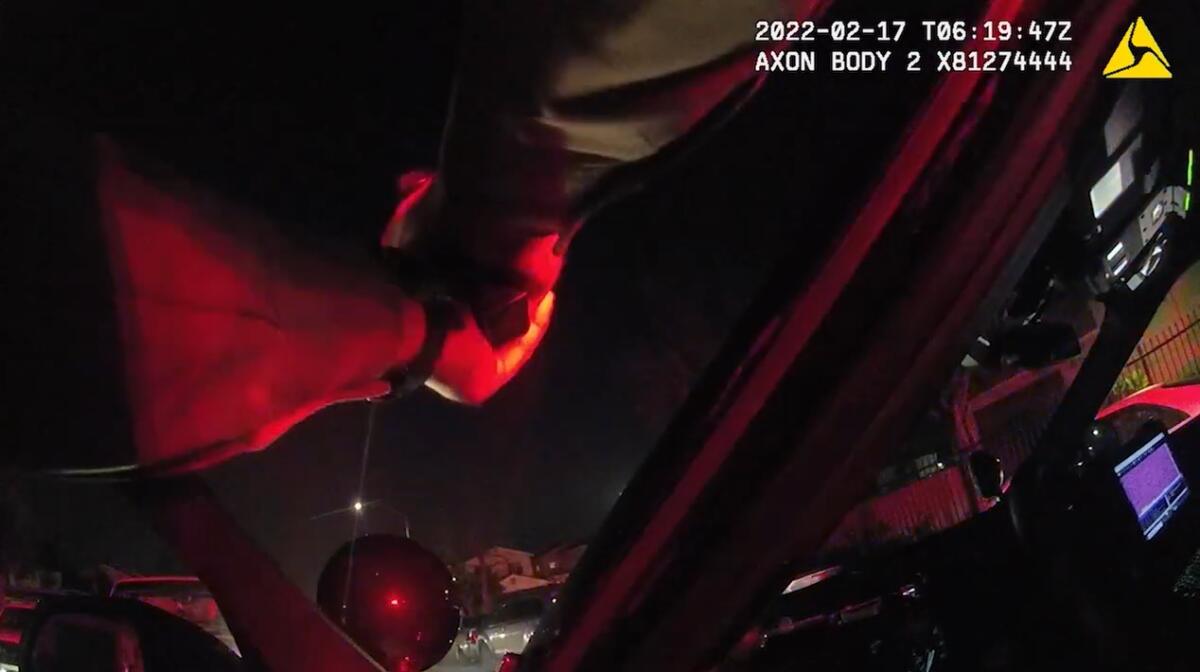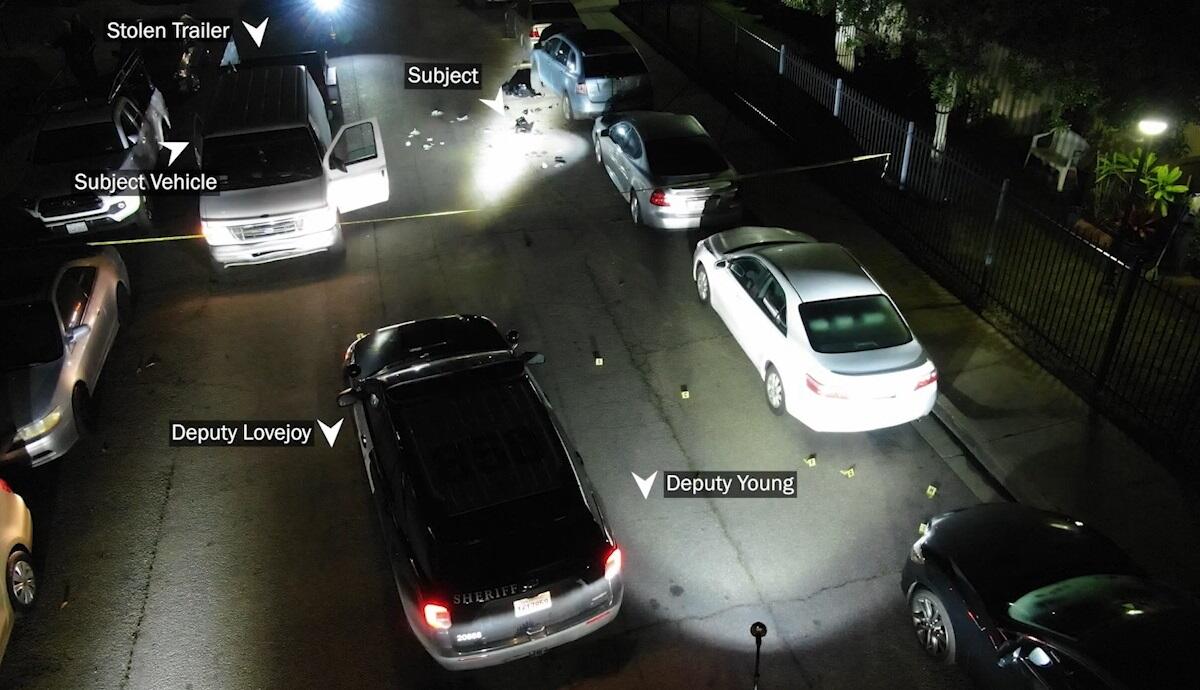National City police detective who was shot by a San Diego County deputy is suing

- Share via
SAN DIEGO — A National City police detective who was shot in the leg by friendly fire during the apprehension of a car-theft suspect last year is suing San Diego County and the two sheriff’s deputies who opened fire, alleging the deputies “were not concerned with the safety of law enforcement officers on scene or bystanders when they fired their weapons.”
The lawsuit, filed in San Diego federal court by Det. Rowdy Pauu, alleges excessive force by Deputies David Lovejoy and Jonathon Young.
It also alleges that then-Sheriff Bill Gore, who has since retired, and his staff failed to properly train, supervise and discipline the deputies, and that the Sheriff’s Department has unlawful policies, customs and habits that led to a violation of Pauu’s civil rights.
In response to questions about the lawsuit and its allegations, a sheriff’s spokesperson said the department does not comment on pending litigation.
Deputies David Lovejoy, Jonathon Young shot and wounded Erik Talavera and a National City police detective on auto theft task force Feb. 16
The shooting that wounded Pauu in his left shin occurred late on the night of Feb. 16, 2022, as the detective and his colleagues on the San Diego County Regional Auto Theft Task Force — known as RATT — were patrolling El Cajon in plainclothes and unmarked vehicles, according to the lawsuit and previous details provided by authorities.
Pauu had been a member of the task force since at least 2017, when he was named the county’s vehicle theft officer of the year. On the night of the shooting, Pauu and other RATT detectives began tracking the movements of a GPS device installed in a “bait trailer,” which they had set up as a trap to catch would-be thieves, according to a review of the incident by the San Diego County District Attorney’s Office.
The RATT detectives asked uniformed deputies to pull over the driver of the van towing the stolen trailer. According to the lawsuit, making that request was more difficult than it should have been because the RATT detectives had been given radios that couldn’t communicate directly with sheriff’s dispatchers.
“The detectives had to contact a sheriff’s deputy using a cellphone, who then relayed the information to dispatch, which then communicated with the deputies who came to the scene,” according to the lawsuit.
This disjointed line of communication was “dangerous and reckless” because it prevented the RATT detectives from communicating directly with the uniformed deputies who would be taking charge of the traffic stop, according to the lawsuit. And that was “particularly dangerous given that RATT members are undercover and unknown to the deputies,” the suit alleges.
Eventually the deputies pulled over the van’s driver in a cul-de-sac in El Cajon. Authorities said Erik Talavera, then 31, exited the van armed with a knife.
The district attorney’s review concluded that both deputies believed the item in his hand could be a small gun.
Body-worn camera footage released last year showed Young arriving after Lovejoy was already pointing his gun at Talavera from behind the door of a patrol SUV. Both deputies shouted at Talavera, who was in the street about three car lengths away, to lie on the ground.
Talavera appeared to be moving toward the ground when both deputies opened fire, the footage showed. After dropping to the ground wounded, the footage showed Talavera pushing his upper body slightly off the ground and grabbing the knife. Lovejoy then fired two more shots.
Investigators determined Lovejoy fired 12 rounds and Young fired five, according to the district attorney’s review. Talavera was shot 16 times and survived.
The body-camera footage does not show Pauu, who was behind Talavera, being struck, and it’s unknown whether the shot that hit him was fired by Lovejoy or Young.
“Defendants Lovejoy and Young were standing behind the doors of their patrol cars and had no need to immediately and recklessly fire their weapons,” the lawsuit alleges. It also alleges they could have deliberated before deciding to shoot, but did not do so, nor did they give a warning before opening fire.

“After shooting Detective Pauu, Defendant Lovejoy told members of the task force that he saw Detective Pauu in his line of sight, but he fired anyway because he thought he ‘could make the shot,’” Pauu’s suit alleges.
Pauu was not able to work for four months and “has endured pain, discomfort, anxiety and fear in the months since this incident,” according to the lawsuit. Pauu alleges that doctors were not able to remove the bullet from his leg for fear of exacerbating his injuries.
“He has been consistently attending physical therapy but will most likely deal with this pain ... for the rest of his life,” the lawsuit alleges.
Julia Yoo, Pauu’s attorney, said it was a tough decision for Pauu to sue the county’s largest law enforcement agency, but that the Sheriff’s Department crossed a line by “creating a potentially lethal environment for officers by not giving them proper radio channels where they can communicate and coordinate with each other.”
She called it a “catastrophe waiting to happen. ... Detective Pauu is advocating for a safer environment for all officers.”
The suit also delves into past incidents that Pauu and his attorneys point to as the Sheriff’s Department’s “long history of failing to train, supervise or discipline its employees on the use of force.” Some of those incidents have been previously reported, such as the deputy convicted of shooting a fleeing man in the back near the downtown jail. Others appear to deal with allegations that have never before surfaced publicly.
“There has been a culture of covering up misconduct, with a de facto policy of ignoring the use of improper force, including lethal force,” the suit alleges. “The supervisors failed to discipline and train deputies who violated citizens’ constitutional rights, often refusing to accept citizen complaints or failing to open an investigation.”
Yoo said the past incidents show that the shooting of Pauu “did not occur in a vacuum.” She said Sheriff’s Department leaders also never contacted Pauu or engaged in conversations about officer safety.
The previously unpublicized allegations include an accusation that Lovejoy pulled a woman out of her car by her hair during a minor traffic stop in October 2020. The woman later complained that Lovejoy “pulled her braids out of her head as he was pulling her out of her car window.” The suit alleges Lovejoy was not disciplined over the incident, remained on the force and received no retraining on the proper use of force.
“This failure led to Lovejoy’s continued and escalating use of unnecessary force,” the suit alleges. “Had Lovejoy faced consequence from the prior allegation of misconduct, he would have learned to use proper tactics instead of endangering the lives of detectives and other bystanders.”
More to Read
Sign up for Essential California
The most important California stories and recommendations in your inbox every morning.
You may occasionally receive promotional content from the Los Angeles Times.















